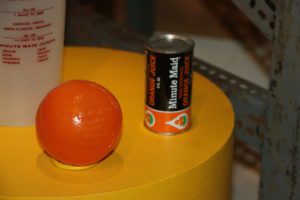
Minute Maid concentrate, the inventor of the category of frozen orange juice, is quietly disappearing from some grocery store frozen food sections, though it is still found at major grocery chains, including Walmart and Publix.
The juice concentrate brand was once an essential component of almost every American freezer. While the commodity FCOJ, or Frozen Concentrated Orange Juice, remains a key unit for financial trading purposes, frozen concentrate is no longer a household staple, especially with the convenience of fresh juice, the popularity of other coffee-based breakfast drinks and the invention of multiple sports nutrition drinks.
The Minute Maid brand was not the first to make frozen foods popular. The freezing of food was popularized by Clarence Birdseye, who began freezing vegetables as Birdseye Frozen Foods in 1927. He is said to have seen the viability of freezing food by watching Inuit natives freeze freshly caught fish. Home freezers exploded in 1928, with General Motors’ introduction of Freon and the Fridgidaire.
The impetus for Minute Maid was World War II, when the troops needed Vitamin C, and the sugar and morning energy of a glass of orange juice. The government requisitioned 500,000 pounds of orange juice mix, but the war ended before it was delivered.
While other juices were easy to freeze, the problem with freezing orange juice, at least initially, was that the taste went sour. The innovation? Freeze orange juice at a temperature so that it would not taste bad. In 1945, scientists Louis G. Macdowell, Edwin L. Moore and Cedric D. Atkins patented the process, which made orange juice easy to ship, and reconstitute.
The patent is described as thus:
The principal object of this invention is to prepare a concentrated fruit juice containing a substantial portion of the original aroma, flavor, and palatability. This may be accomplished by adding a portion of fresh, single-strength juice to a relatively strong concentrate (however prepared) and thereby obtaining a concentrate of medium strength. The fresh juice returns much of the natural aroma, flavor, and palatability to the concentrate. We have found that when concentrates prepared in this manner were diluted to original concentration with water, the resulting product is superior in aroma, flavor, and palatability to similar products prepared from conventional vacuum concentrates, and is hardly distinguishable from fresh juice.
U. S. Patent 2,453,109 Method of Preparing Full Flavored Fruit Juice Concentrates
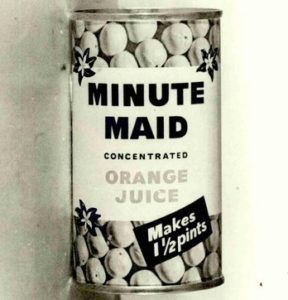
Out of that invention, Florida Foods, renamed Vacuum Foods Corporation, shipped the first frozen concentrated orange juice product in the U.S. The product became known as Minute Maid, with the first use of the trademark in April of 1946. Not only was the product easy to use, it came in a handy, barrel-like can (original version at right), which could easily fit in supermarket freezer cases. The product also solved the problem with citrus fruit, in that it did not have to only be eaten in season.
Other brands joined Minute Maid in selling frozen juice, including Birdseye, Florida Gold, Pictsweet, Sunkist, Finer Foods, Golden Holly and Donald Duck.
After the war, more and more households had larger freezers, and even deep freezes, which meant that almost every American household kept frozen orange juice religiously. The product is so significant to American life that there is a display of it at the Smithsonian’s National Museum of American History.
Advertising by actor and singer Bing Crosby helped make Minute Maid a household name. Crosby was so associated with the product that many thought he actually owned the company, which was purchased in 1960 by Coca-Cola.
Later, new orange juice brands like Tropicana (later purchased by Pepsi) and Donald Duck grew by selling reconstituted or fresh squeezed orange juice in the milk or refrigerated aisle. And Coca-Cola expanded Minute Maid into other juices, later launching the Simply Orange brand to compete with Tropicana.
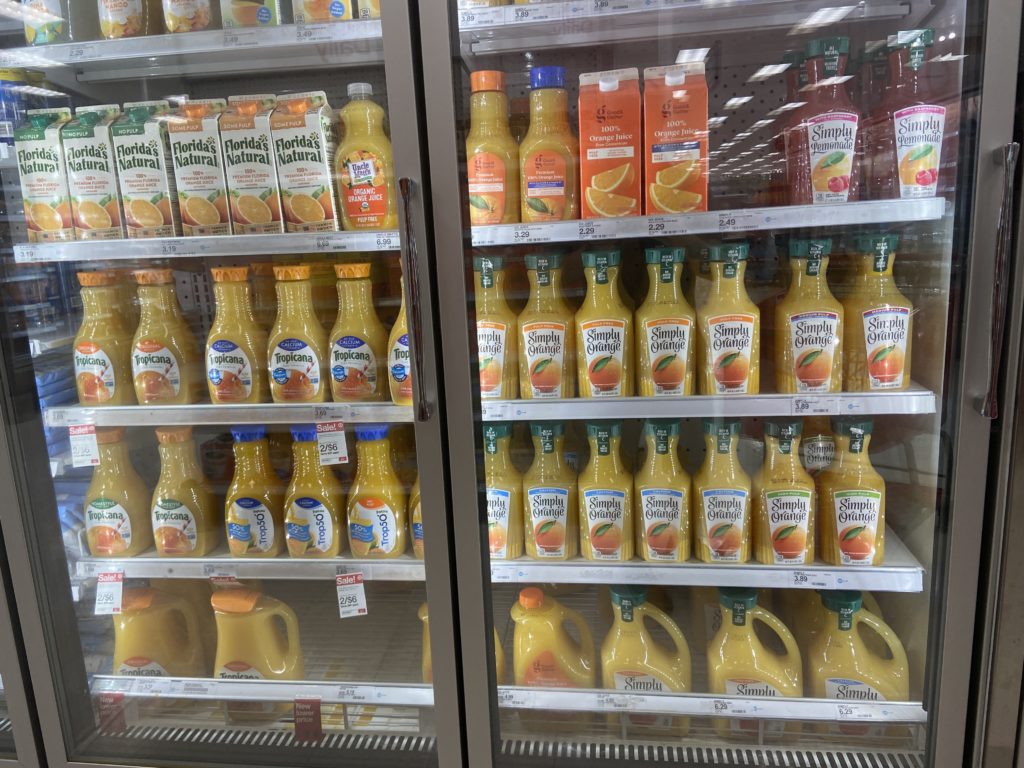
Currently, the frozen juice section is diminished, offering store brands, Minute Maid, and Bacardi mixers. Other brands have disappeared from the frozen drink section entirely, including fruit juices like Five Alive.
Future in Frozen
There is no reason why concentrate can’t grow again. A few reasons:
- Frozen orange juice keeps for months, and is shelf stable. That means that even though households continue to drink freshly squeezed juice for convenience, having a good supply of it in the freezer is practical. Not only is the drink inexpensive, but in an age of food shortages and supply chain disruptions, it is sensible to have it as an essential part of every freezer. Not only for preppers, but for everyone.
- Frozen foods in general have grown as a category of food, a result of new market entrants and foods. Before this burst of interest in frozen foods, they had been seen as a dead category in grocery stores. Today, the aisle is associated with health, convenience and high margins. There is no reason this cachet cannot extend to frozen juice.
- Frozen citrus is not just about orange juice. Bacardi and other drink mixes are popular for parties and at holiday time, as is lemonade. Perhaps there might be a market for Chick-fil-A frozen lemonade? Or are there other smoothie and fruit drinks that could expand the category again?
- While orange juice consumption has been unfairly tainted by fad diets, it remains an easy way to get Vitamin C. Orange juice saw growth in sales during the pandemic, when families were home and the value of ascorbic acid (its chemical name) in healing was emphasized. Minute Maid would do well to going back to promoting the health aspects of orange juice. Health is a key asset for Minute Maid. For instance, lemonade grapefruit juice are both candidates to expand the category, the latter appealing, according to the American Heart Association, because of its lycopene, potassium, beta carotene and flavonoids.
Below, a typical Minute Maid ad from the era of Bing Crosby. A note that today’s Bing Crosby, Michael Buble, is selling Pepsi’s Bubly flavored water. Below that, the Crosby family at breakfast, in a later version of the series. Note that the mixing is done at the table, in a ceremonial way.

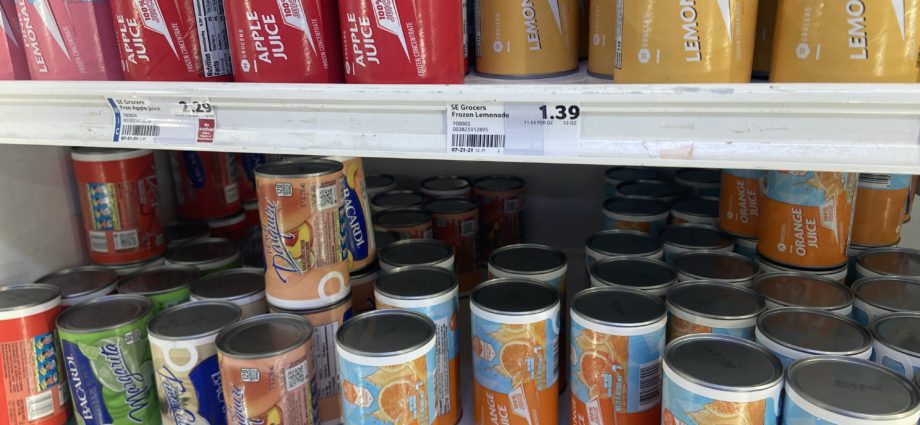

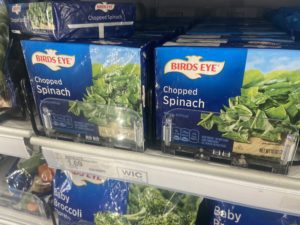
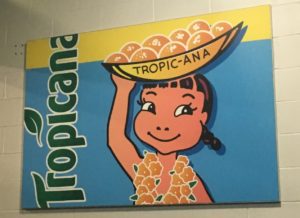

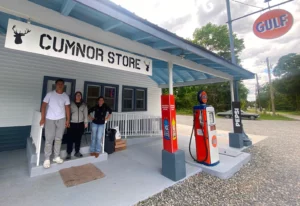
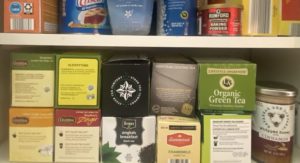
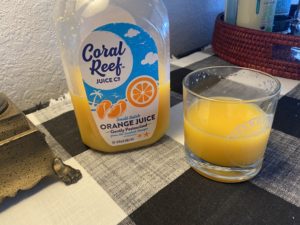
“The innovation? Freeze orange juice at a temperature so that it would not taste bad.”
It didn’t work. That stuff tastes horrible! I never could figure out why my parents bought it instead of real orange juice. Yuck. Hated that stuff. Is it that much cheaper to be worth the nasty taste? (Not that juice in general is anything but fruity tasting sugar water anyway. There are many ways 1000x healthier to get your vitamins than juice. Really. And not because it’s maligned by “fad diets” – but because the value of juice has been disproven by science.)